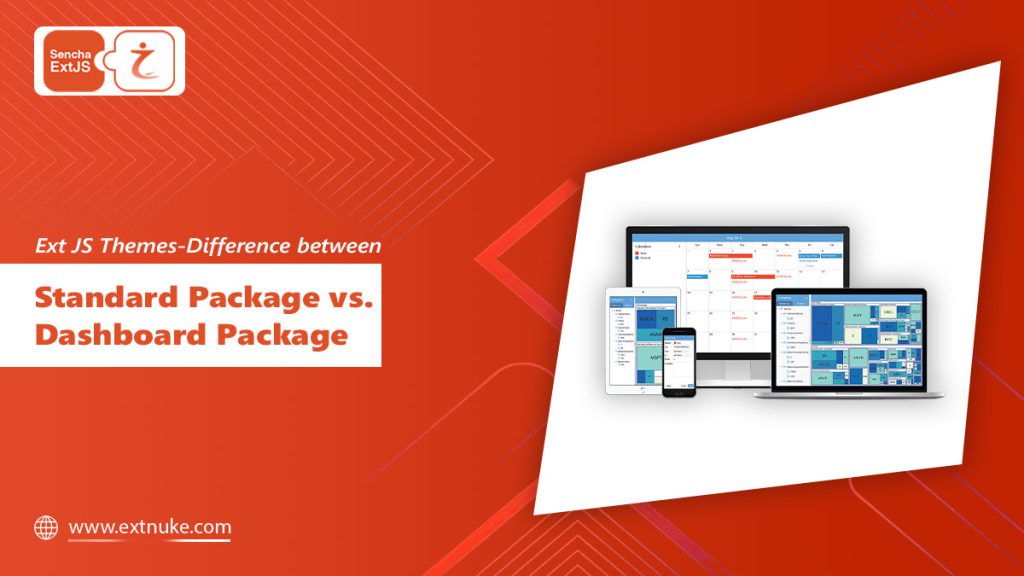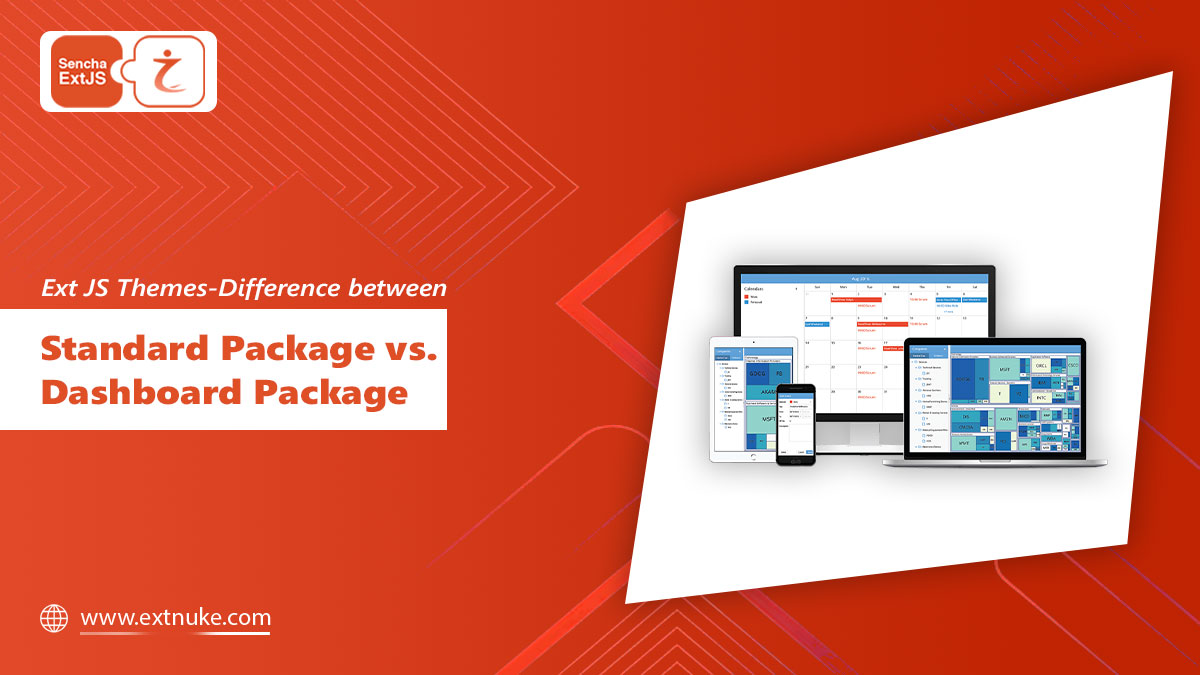Ext Nuke offers a variety of meticulously crafted Ext Js themes, each tailored to enhance user experience through unique and attractive aesthetics and functional components. Ext Nuke’s themes are renowned for their ability to transform Ext JS applications into visually captivating and user-friendly interfaces..
In addition to these, Ext Nuke offers the Standard Package and Dashboard Package that stand out as versatile choices for developers, each serving specific needs within Ext JS applications. In this article, let’s delve into the core difference of these packages and help developers and designers to make informed decisions based on their project requirements.

Standard Package: A Foundation for Classic and Modern Toolkits
The Standard Package serves as a foundational choice for developers looking to integrate Ext Nuke’s themes into their applications. Every one of our theme packages is designed to support both Classic and Modern toolkits of Ext JS and targets a specific major version of Ext JS, both of which you can choose while ordering the theme. It caters a comprehensive set of Ext Js components from the target Ext JS version and toolkit to create a visually appealing and functional interface.
Components Supported in the Standard Package
In Classic Toolkit :
In classic toolkit the following components are included to ease in building standard interface with respect to any of theExt NUke Theme. These components are thoroughly tested to ensure they work smoothly with the chosen version of Ext JS.
Ext.button.Button
Ext.button.Split
Ext.form.field.Checkbox
Ext.form.field.ComboBox
Ext.form.field.Date
Ext.form.field.Display
Ext.form.field.File
Ext.form.field.FileButton
Ext.form.field.Number
Ext.form.field.Radio
Ext.form.field.Text
Ext.form.field.TextArea
Ext.form.field.Time
Ext.form.field.Trigger
Ext.form.FieldContainer
Ext.form.FieldSet
Ext.form.Label
Ext.form.Panel
Ext.grid.Panel
Ext.list.Tree
Ext.LoadMask
Ext.menu.CheckItem
Ext.menu.Item
Ext.menu.Menu
Ext.menu.Separator
Ext.panel.Panel
Ext.panel.Tool
Ext.picker.Date
Ext.Progress
Ext.slider.Single
Ext.tab.Bar
Ext.tab.Panel
Ext.toolbar.Item
Ext.toolbar.Paging
Ext.toolbar.Separator
Ext.toolbar.Spacer
Ext.toolbar.TextItem
Ext.toolbar.Toolbar
Ext.tree.Panel
Ext.window.Window
In Modern Toolkit :
In the modern toolkit the following components are added to ensure compatibility and consistent aesthetics across different versions of Ext JS.
Ext.Button
Ext.carousel.Carousel
Ext.Dialog
Ext.field.Checkbox
Ext.field.ComboBox
Ext.field.Container
Ext.field.Date
Ext.field.Display
Ext.field.Number
Ext.field.Text
Ext.field.TextArea
Ext.field.Time
Ext.field.Radio
Ext.field.Toggle
Ext.field.trigger.Trigger
Ext.form.Panel
Ext.grid.Grid
Ext.grid.plugin.PagingToolbar
Ext.grid.Tree
Ext.list.Tree
Ext.Mask
Ext.menu.Item
Ext.menu.Menu
Ext.menu.Separator
Ext.Panel
Ext.panel.Date
Ext.Progress
Ext.slider.Slider
Ext.SplitButton
Ext.tab.Bar
Ext.tab.Panel
Ext.tab.Tab
Ext.Tool
Ext.ToolBar
Dashboard Package: Elevating UI with Custom Components
The dashboard package extends the functionality of the standard package by introducing a specialized set of custom Ext js component tailored for dashboard applications. The Dashboard Package contains both the javascript code for the component as well as the theme-specific styling needed to gel that component for any Ext Js Theme. Beyond the foundational components of the Standard Package, the Dashboard Package equips developers with tools to create dynamic and data-rich dashboards that are as functional as they are visually appealing. Moreover, all the Dashboard components are supported by both Classic as well as Modern toolkits.
Custom Components in the Dashboard Package
Included in the Dashboard Package are custom components like :
StatCards for displaying vital statistics,
ActivityLists and ActivityTimelines for tracking events and milestones,
ChatLists for integrating chat functionality,
ToDoLists for managing tasks,
Progress grids for visualizing project milestones,
UserProfile panels for showcasing individual and team achievements.
Key Differences: Standard vs. Dashboard Packages
The main difference between the Standard and Dashboard Packages lies in their focus and the types of components they offer.
The Standard Package is ideal for building standard user interfaces across different toolkits of Ext JS. It provides essential components that ensure a cohesive and visually pleasing design.
On the other hand, the Dashboard Package is geared towards projects that require advanced dashboard features. It includes specialized components that enhance data visualization, task management, and team collaboration within Ext JS applications.
Conclusion
Ext Nuke’s Standard and Dashboard Packages offer distinct advantages depending on the development needs of Ext JS applications. Whether aiming for a serene and cohesive UI design or looking to elevate functionality with custom dashboard components, understanding these differences is crucial in selecting the package that best aligns with project goals. By leveraging the strengths of each package, developers can enhance user experiences and streamline development efforts within the Ext JS ecosystem.



Pingback: Ext JS Themes- Difference between Standard Pack...